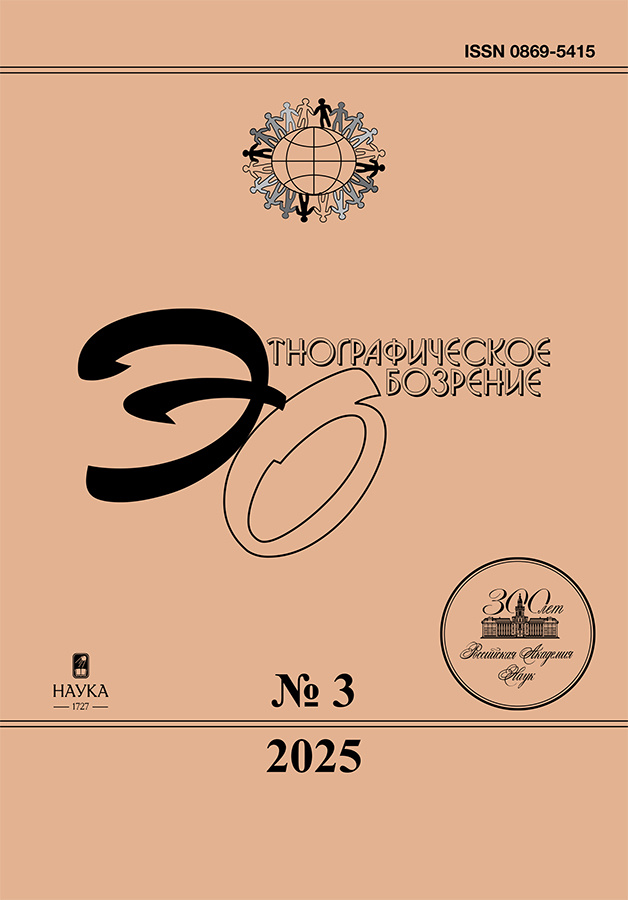Traumatic memory and the cossack revival
- Authors: Shnirelman V.A1
-
Affiliations:
- Institute of Ethnology and Anthropology, Russian Academy of Sciences
- Issue: No 1 (2023)
- Pages: 84-101
- Section: Articles
- URL: https://ruspoj.com/0869-5415/article/view/672300
- DOI: https://doi.org/10.31857/S0869541523010062
- EDN: https://elibrary.ru/PMLYQN
- ID: 672300
Cite item
Abstract
As a rule, a traumatic memory includes two points: a memory of the recent tragedy and a view of the lost Golden Age, i.e. victimization combines with glorification which has to offset a disadvantage with the help of symbolic images. This dichotomy is analyzed with respect to the Cossacks whose memory maintains both the tragedies of the Civil war including their relocation, and a reference to the deep past with an emphasis on indigenous ancestors and also dreams of the own state. At the same time, the Cossack's narrative confronts the North Caucasian views of the past which are also fed by the traumatic memory. A clash of memories provokes a territorial conflict. The historical constructs of the Cossack emigree historians made an impact on the post-Soviet Cossack historiography.
Keywords
About the authors
V. A Shnirelman
Institute of Ethnology and Anthropology, Russian Academy of Sciences
Email: shnirv@mail.ru
Moscow, Russia
References
- Ахмадов Ш.Б. (ред.) История Чечни с древнейших времен до наших дней. Т. 1. Грозный: Книжное изд-во, 2006.
- Баранов А.В. Российская государственность и Северный Кавказ: критика идеологии "самостийности" // Кентавр. 1993. № 6. С. 34-41.
- Битова Е.Г., Боров А.Х., Дзамихов К.Ф., Саральпов З.С. Современная Кабардино-Балкария: проблемы общественной динамики, науки и образования. Нальчик: Эль-Фа, 1996.
- Благова Г.Ф. Исторические взаимоотношения слов "казак" и "казах" // Этнонимы / Отв. ред. В.А. Никонов. М.: Наука, 1970. С. 143-159.
- Гакаев Д.Д. Очерки политической истории Чечни (XX век). М.: Чеченский культурный центр, 1997.
- Гарданов Б. Покорение Кавказа в военной историографии // Известия Северо-осетинского НИИ. 1935. Т. 8. С. 233-271.
- Гонов А.М. Северный Кавказ: актуальные проблемы русского этноса (20-30-е годы). Ростов-на-Дону: Ростовская высшая школа МВД РФ, 1997.
- Данлоп Д. Россия и Чечня: история противоборства. М.: Р. Валент, 2001.
- Дзуцев Х.В. Этнополитический конфликт в Северной Осетии и вокруг нее // В тумане над пропастью. Владикавказ: Ир, 1994. C. 88-111.
- Дулимов E.И., Цечоев В.К. Славяне средневекового Дона (к вопросу о предпосылках формирования казачьей государственности). Ростов-на-Дону: Ростиздат, 2001.
- Ибрагимова З.Х. Чеченская история: политика, экономика, культура второй половины XIX в. М.: Евразия, 2002.
- Игнатенко А.А., Салмин А.М. Конфедерация народов Кавказа в политическом контексте Кавказского региона // Мировая экономика и международные отношения. 1993. № 9. С. 96-107.
- Кириенко Ю.К. Казачество в эмиграции: споры о его судьбах (1921-1945 гг.) // Вопросы истории. 1996. № 10. С. 3-18.
- Кислицын С.А. О соотношении российской и региональной идентичности в исследованиях по истории краев и областей Российской Федерации // История края как поле конструирования региональной идентичности: материалы семинара, проведенного Волгоградским государственным университетом и Институтом Кеннана 11 апреля 2008 года / Под ред. И.И. Куриллы. Волгоград: Изд-во ВолГУ, 2008. C. 75-88.
- Козлов С.А. Кавказ в судьбах казачества (XVI-XVIII вв.). СПб.: Кольна, 1996.
- Коломиец В.Г. Очерки истории и культуры терских казаков. Нальчик: Эльбрус, 1994.
- Крицкий Е.В. (ред.) Чеченский кризис в массовом сознании населения Северного Кавказа. Краснодар: Северо-Кавказский центр Института социально-политических исследований РАН, 1995.
- Кушева Е.Н. Народы Северного Кавказа и их связи с Россией (вторая половина XVI - 30-е годы XVII века). М.: АН СССР, 1963.
- Маркедонов С.М. От истории к конструированию национальной идентичности (исторические воззрения участников "Вольноказачьего движения") // Ab Imperio. 2001. № 3. С. 527-558.
- Монгайт А.Л. Надпись на камне. М.: Знание, 1969.
- Мужухоев М.Б. Ингуши. Страницы истории, вопросы материальной и духовной культуры. Саратов: Детская книга, 1995.
- Музаев Т., Тодуа З. Новая Чечено-Ингушетия. М.: Панорама, 1992.
- Плетнева С.А. Беспокойное соседство. Русь и степные кочевники в домонгольское время // Родина. 1996. № 12. С. 28-41.
- Скорик A.П. Возникновение донского казачества как этноса: изначальные культурные традиции. Учебное пособие для студентов по базовому учебному курсу "История России". Новочеркасск: Новочеркасский политехнический институт, 1992.
- Скорик А.П. (ред.) Казачий Дон: очерки истории. Ч. 1. Ростов-на-Дону: Изд-во Ростовского областного института усовершенствования учителей, 1995.
- Таболина Т.В. Возрождение казачества. 1980-1994. Истоки. Хроника. Перспективы. М.: ИЭА РАН, 1994.
- Трепавлов В.В. (ред.) Россия и Северный Кавказ: 400 лет войны. М.: ИРИ РАН, 1998.
- Хунагов А.С. "Выселить без права возвращения…". Депортация народов юга России. 20-50-е годы (на материалах Краснодарского и Ставропольского краев). Майкоп: Меоты, 1999.
- Черницын С.В. Донские татары: некоторые вопросы этнической истории и расселения // Историческая география Дона и Северного Кавказа / Ред. В.Е. Максименко, В.Н. Королев. Ростов-на-Дону: Изд-во Ростовского ун-та, 1992. С. 106-114.
- Шнирельман В.А. Злоключения одной науки: этногенетические исследования и сталинская национальная политика // Этнографическое обозрение. 1993. № 3. С. 52-68.
- Barrett T.M. At the Edge of Empire: The Terek Cossacks and the North Caucasus Frontier, 1700-1860. Boulder: Westview, 1999.
- Lieven A. Chechnya: Tombstone of Russian Power. New Haven: Yale University Press, 1998.
- Skinner B. Identity Formation in the Russian Cossack Revival // Europe-Asia Studies. 1994. Vol. 46. No. 6. P. 1017-1037.
Supplementary files











